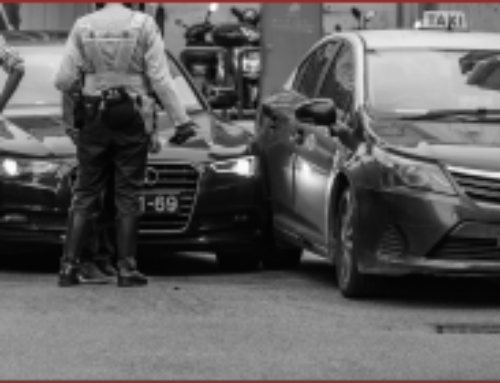Important Steps to Take When Involved in a Car Accident
Thousands of residents of our area suffer from automobile accidents each year. Thankfully most of the accidents are minor fender-benders. Many of these accidents are caused by another driver’s negligence or recklessness, like speeding or drunk driving. You cannot influence the behavior of other drivers. What you do when they injure you, however, is firmly within your control.
Few people immediately realize how serious their injuries are when they are involved in motor vehicle accident. Symptoms of serious injury do not always present immediately after the collision. Concussions, neck sprains, back injuries, and nerve damage may take weeks to detect, and require months or even years of treatment to heal. Below are the basic but necessary steps that we recommend to take when involved in a car accident.
If you are involved in a vehicle accident that results in injuries or property damage, follow these steps:
1. Call or have someone else call 911 immediately.
2. Move the vehicles out of the danger zone, if it can be done safely. Though you must try to preserve the accident scene for police investigation, vehicles should not be left in a dangerous position if they can be moved, nor should passengers remain in such vehicles. Make every effort to prevent further accidents. You may be liable for damages to approaching vehicles unless they are properly warned. If the highway is obstructed at night, have someone with a flashlight warn approaching motorists. Set out flares and reflectors if available.
3. Locate witnesses. Get the names, addresses, and telephone numbers of as many witnesses as possible. Witnesses will be a tremendous help in court if liability is in question. If they refuse to identify themselves, jot down the license numbers of their automobiles. Do not discuss the accident with the witnesses. Do not give their names to anyone but the police, your attorney, or your insurance company. Remember to get the name and badge number of any police officials who appear on the scene.
4. Take photographs. In today’s world everyone has a cell phone with camera. You should utilize it. The first thing to do after ensuring the safety is to photograph the cars, injuries, damages, road, any evidence and surroundings. Photographs taken immediately after the accident often become the most crucial evidence.
5. Call traffic officials. Request the presence of a police officer or highway official and briefly give the basic facts of the accident. An official report may help you later if a liability claim is made.
6. Exchange information with other drivers. Give your name and address and show your driver’s license and insurance identification card to the person who is injured or whose property is damaged, or to a police officer. Obtain the names and addresses of all other drivers involved, along with the names and addresses of all passengers. Also note the ownership, license number, year, and make of all vehicles involved in the accident. If possible, obtain the names of the insurance companies and the policy numbers covering the other vehicles in the accident.
7. Write down the details of the accident. Write down the details of the accident as soon as you can, including the date and time, the road conditions, the weather conditions, and the approximate speed of all other cars involved. It also is a good idea to draw a diagram of the accident showing the position and direction of the cars just prior to and after the accident. Again, take photographs.
8. Contact a Lawyer. Most personal injury lawyers, such as the lawyers at I.S Law Firm, offer absolutely free consultations and case evaluations for personal injury matters. You should have a lawyer handle filing of the insurance claims and any communications with insurance companies. The minute after a claim is filed or the insurance carrier becomes aware of the accident, the insurance company begins its quest for poking holes in your case, exploring every possible way to minimize or deny the claims. They will trick the injured claimant into believing that, providing a recorded statement to the insurance company will somehow speed up the process or increase the chances of higher compensation. This is a trap! The adjuster will play your friend and try to seem compassionate about your injuries. However, the true intent is to use every possible way to mercilessly deny your claims. The insurance adjuster will record the telephone conversations and lure you into making damaging statements, misinterpret and misconstrue your every word in light most favorable to his employer – the insurance company.
9. Make no payments, or promises to pay, to any claimant. Refer all persons making claims against you to your insurance company. Immediately send your insurance company all legal papers served on you. If the coverage you have purchased is not adequate to cover the claims made against you, consult your lawyer immediately. Remember, you may have insurance coverage under more than one policy.
10. See a doctor as soon as possible, if you think you may be injured. Potentially serious and costly injuries may seem minor or non-existent at first.
11. If you have any questions about your right to sue for either personal injury or property damage, Contact Our Personal Injury Lawyers


